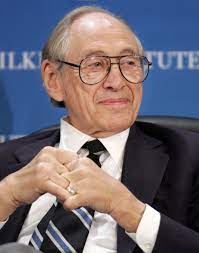Toffler, Alvin

Bio: (1928-2016) American sociologist. Alvin Toffler received a bachelor's degree in English from New York University and had no formal education in the social sciences. However, Toffler became one of the most eminent sociologists and futurologists, which enabled him to be a lecturer at Cornell University and the New School of Social Research. In addition, he conducted paid research for technology companies IBM and Xerox.
Toffler became famous after the publication of his first book, Future Shock (1970), which he wrote with his wife Heidi Toffler. The „future shock“ refers to the psychological state of disorientation and stress, that people and societies experience when radical changes occur in a short period. Toffler believes that people have a limited ability to adapt to social and technological transformations, so the speed of change is the one that causes the greatest negative psychological consequences, and not the direction or orientation of the change. The future shock will only increase over time, as technological and social changes will be even more drastic. The consequences of this process are many: changes in interpersonal relations, increased individual and collective mobility, increased social stratification, and diversity, increased consumption of new goods, and the like. He believed that societies must actively manage these changes because they are taking place at such a speed that individuals and societies cannot manage to adapt to them.
In his book The Third Wave (1980), Toffler continues his research into the consequences of technical and social change. He examines how changes affect the creation of new forms of marriage and family, dramatic changes in the economy, the emergence of new forms of work and entertainment, and possible new forms of democracy. In the book, Powershift (1990) Toffler concludes that the global consequences are great, but that the greatest consequences are felt in everyday life, and that in the future the biggest difference will be the ability of those "fast" and "slow" to adapt to rapid change.
The book Revolutionary Wealth (2006) brings Toffler's research into the question of how wealth will be created in the future, who will create it, and how it will be distributed. The wealth of the twenty-first century will not be created in the domain of classical industry, but through many fluid and networked forms of work and education, but also consumption. The concept by which Toffler explains this creation of wealth is "prosumation", a term that represents a combination of the words production and consumption. Toffler uses this concept to describe a situation in which people, through daily activities, produce what they consume themselves and thus perform unpaid work for large corporations. Volunteering, blogging, ordering goods online, and other activities enable the transfer of wealth from the non-monetary to the monetary economy. Toffler predicts that prosumation will increase tremendously in the future, which will introduce many changes in the way we measure, create and manage wealth.
Fields of research
Civilization Corporations Democracy Everyday Life Futurism Industry Mobility, Social Psychology Technology Time Violence War WorkMain works
Future Shock (1970);
The Futurists (1972);
Learning for Tomorrow (1974);
The Eco-Spasm Report (1975);
The Third Wave (1980);
Previews & Premises (1983);
The Adaptive Corporation (1985);
Powershift: Knowledge, Wealth and Violence at the Edge of the 21st Century (1990);
Creating a New Civilization (1995);
War and Anti-War (1995);
Revolutionary Wealth (2006).

